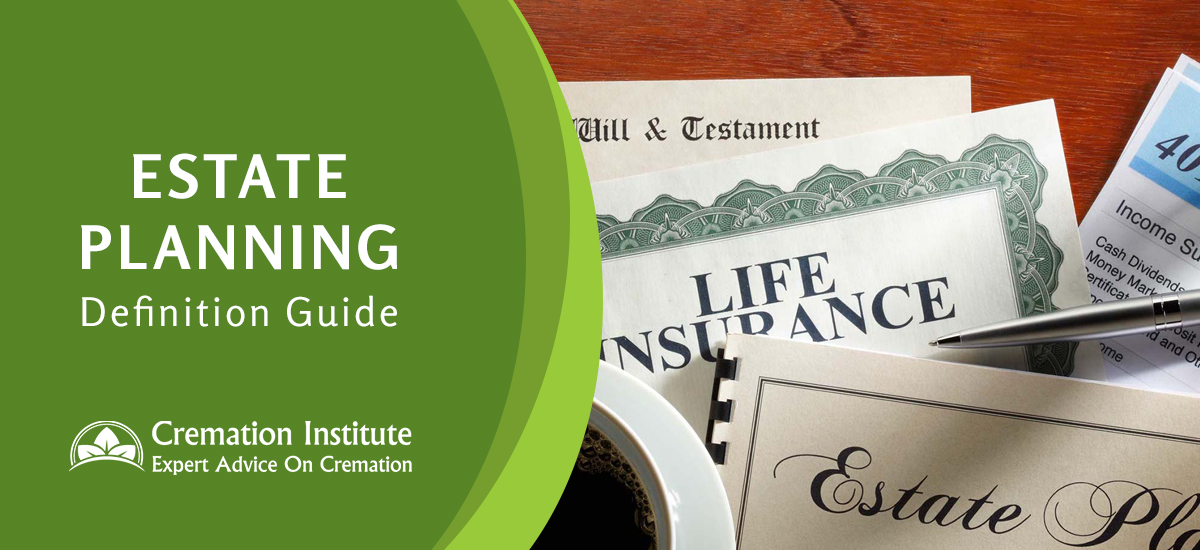What Is An Estate? Estate Planning Guide


Written by Kim Pinnelli: Estate Planning Consultant
 Reviewed by Adam Binstock On November 25, 2020
Reviewed by Adam Binstock On November 25, 2020
Article Highlights
What Is An Estate? What Is Estate Planning? Writing A Will Wills Vs Trusts After Death Life Insurance & Estate Planning Estate Taxes Common Planning Mistakes Estate Planning Costs Finding An Estate AttorneyUnderstanding your estate and how to plan it is important for your family.
Without proper estate planning, you could leave your family with financial issues instead of financial security during their time of grief.
What Is An Estate?
Your estate is everything you own that makes up your net worth. It may include personal assets (belongings), land, money, and/or investments.
Anything that you own with value is a part of your estate.
What Is Estate Planning?
Estate planning refers to how your assets will get distributed when you pass. But it also covers how you want your health handled when you are no longer able to make decisions for yourself.
Your estate plan may include some or all of the following:
A will
This details who you want your assets distributed to, and in what amount.
Your will also dictates who will distribute your assets (the executor of the will) and who will take guardianship of your children.
A financial power of attorney
This is someone you appoint to make financial decisions for you if you become incapacitated.
A trust
This is a legal arrangement made so the property can transfer rights to your beneficiaries when you pass, rather than going through probate.
Trusts are also used for tax benefits and to protect the property from certain creditors or Medicare.
Medical directives
Your estate must include medical directives that appoint a strong power of attorney should you be unable to make your own healthcare decisions.
It may also include a living will that dictates your wishes should you become incapacitated and don’t want to be kept on life support.
Writing A Will
A will is the most basic part of an estate plan, but also the most powerful. It does things a trust cannot do, so don’t skip this step.
Your will dictates who your beneficiaries are, who the executor is, who will take care of your children, and how to distribute your assets. At the very least include the following in your will:
Name a guardian for your children
If you and your spouse were to die, who would care for your children?
You probably want a say in where they go, which is why a will is so important for parents. By law, most children go to the next closest relative, but if that’s not what you want, spell it out in a will.
Distribute assets
You can distribute your assets the way you want in a will. Assets could be anything from a car to a bank account, or even your antique jewelry.
Name any assets you own that would become a part of your estate. The executor of your will must follow the will according to what you wrote.
Wills Vs Trusts
As you plan your estate, you’ll hear the words wills and trusts a lot. While they are similar, you always want a will, and oftentimes you’ll have a will and a trust.
A will can do things a trust can’t, as I discussed above, especially if you have children. When it comes to distributing your assets, you’ll choose between a will and a trust.
Trusts are more complex and therefore cost more money. But, they have their advantages – your beneficiaries don’t have to go through probate.
In other words, they get immediate access to your assets rather than the delay probate causes.
What is probate?
Probate is a court case, where the judge evaluates the estate and determines how to proceed. It can cause delays lasting several months.
When it comes to making changes, though, a will is much easier to handle. You can make changes as often as you want with little difficulty.
A trust, on the other hand, is harder to change, and sometimes can’t be changed (if it’s irrevocable).
After Death
When a person passes, the estate administration begins. If there is a trust, the assets immediately get distributed according to the will.
If there isn’t a trust, the assets may have to pass through probate. The creditors will also receive payment from the estate, and the remaining assets then get distributed.
The will shows who the executor of the will is, i.e who will administer the estate. This person is responsible for filing the probate petition and providing notice to everyone involved in the estate.
The executor must also advertise the estate so that any creditors with an interest can come forward. Once the executor satisfies all debts, they can distribute the assets as outlined in the will.
Life Insurance & Estate Planning
Life insurance is usually a big part of estate planning as it plays an integral role in what you leave behind for your loved ones.
Life insurance can serve as income replacement for your loved ones or it can be used as a financial tool to take care of taxes and other debts, such as mortgages or consumer debt.
This is most important for those with a large estate as heirs would shoulder the tax burden of estate taxes, but life insurance proceeds can cover the debt.
Estate Taxes
Just like your income, Uncle Sam has his hand in the pot of an estate too. Estates are often subjected to state and federal taxes, but with a few simple strategies, you can offset them.
- Set up an A-B trust to offset the estate taxes upon the death of a spouse
- Transfer the trust funds to a 529 College Savings Plan to offset taxes
- Freeze the state, this involves ‘freezing the estate’s value as-is.’
Common Planning Mistakes
Estate planning is complicated, overwhelming, and even emotional. Understanding the most common mistakes is important to keep your planning on target. Avoid these common mistakes:
Not updating beneficiaries
Certain assets, such as life insurance and retirement accounts have separate beneficiaries designations. What you put in your will doesn’t matter if these assets say otherwise.
Not updating ownership
Life changes, but sometimes we forget about the designations we made years ago. Bank accounts and other financial accounts are common examples.
If you don’t remember who’s on your accounts, it could pose problems when it‘s time to distribute your estate.
Forgetting to transfer assets to the trust
Setting up a revocable trust is a great way to protect your assets, but it only works if you put the assets into the trust.
Some assets automatically transfer over when you set up the trust, but many don’t. Real estate, financial accounts, and vehicles are all great examples.
Not updating power of attorneys
You need at least 2 power of attorney’s – a financial POA and a healthcare POA.
These determine who will oversee your estate, financial decisions, and medical decisions on the chance that you can’t.
Not asking questions
Most importantly, make sure you continually revisit your estate plan and update it accordingly and if you don’t understand something – ask!
Don’t just sign on the dotted line and assume the professionals have you covered.
Estate Planning Costs
No 2 estate plans have the same fees. Every situation is unique.
The fees you pay depend on the complexity of the situation including your amount of wealth and the situations you need covered, guardianship for children, health directives, and trusts, etc.
You’ll come across two types of fees charged for estate planning:
Flat fees
Attorneys can often determine a flat fee for estate planning when you have a simple situation that they can handle in a few hours.
Wills, power of attorneys, and appointment of guardianship are all examples of what can fall under the flat-fee model.
Billable hours
If you have a more complex situation, expect to pay billable hours. Most attorneys require a retainer upfront that covers the initial billable hours spent working on your estate.
The attorney will bill you for further hours or ask for another retainer if he/she runs out.
Make sure you understand the costs before moving forward. Get everything in writing and ask any questions you have so you don’t pay more than you expected for estate planning.
Finding An Estate Attorney
If you don’t specifically know an attorney, you need to find someone you can trust. It’s not an easy job since you’re putting your family’s livelihood on the hook.
Use these simple steps to find the right attorney.
Ask friends and family for referrals
Consulting an attorney recommended by someone you trust used is a great way to start. Always read reviews and do your own homework too, but it’s a good way to get your search going.
Ask your financial professionals for referrals
If you have a financial or tax advisor, they may know people in the field. Most professionals network, and recommend who they would trust with their own estate.
Do your research
Don’t fully rely on what anyone else says. Look up an attorney’s ratings and reviews. See how you feel about him/her before contacting them. Talk to a few attorneys.
Once you narrow your list down to a couple of attorneys, interview them. See how you feel about each one. You’ll know just by talking to him/her how you feel, but here are some questions to ask:
- What experience do you have?
- How often do you deal with estates similar to mine?
- Where did you get your law degree?
- How do you communicate with clients?
- What do you charge?
- Do you update estate plans or will that be an extra charge?
- What other fees can I expect?
Compare providers
The final step is to look at each attorney side-by-side. Look at their fees, services, method of communication, and reviews. Determine which one suits your needs the most.
Dealing with your estate is a big job. Don’t take it lightly and get the professional help you need to ensure everything is handled correctly.
Always update your estate and revisit it often to make sure you don’t need to make changes that you didn’t even think of.
Proper estate planning ensures the financial stability of your family and loved ones.


I agree that you can’t just trust anyone with your estate because your whole family’s livelihood is on the line. I’d only trust a lawyer honestly. I’d get to know them first and then hire them to write my estate and to make sure it all goes accordingly.